Cambridge RFC - University Challenges
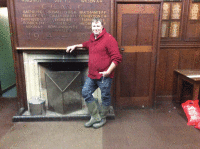
"My education in groundsmanship came in a roundabout way," explains David, "starting with an OCN (Open College Network) in countryside management, then doing chainsaw certificates, spraying certificates and an OCN in hard landscaping, before eventually starting an NVQ 2 in Sports Turf and Amenity Horticulture."
"Two years later I started NVQ 3 in Sports Turf and Amenity Horticulture at Pencoed Agricultural College, just outside Bridgend, where I had two great teachers, Paul Discombe and John Sullivan, who taught me there's more to looking after grounds than simply cutting grass, marking lines and picking up litter. In the last two years, I have just finished an NVQ 4 in Sports Turf Management with the College of West Anglia. My very conscientious tutor was Phillippa McDonald, but the person who inspired me the most was my old foreman in Wales called Ken who, we found out when he passed away, had received the Burma Star. He was always happy in his work."
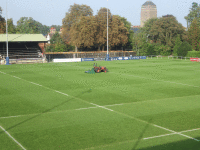
"Due to the structure of the ground being on a river basin, we have large silt particles and a bed of ¾" stone to pea shingle at about ten inches down. So we have to use an iron sand of 0.0015-0.0025 size so that our sand particles are smaller than the silt particles. Drainage has always been a problem at the site!"
David works alone but hires a contractor to undertake large work such as a renovations, vertidraining and topdressing. "We also have an agronomist who analyses the soil to make sure that everything is right. Apart from that, it's all me!"
His lone worker status has been tested in recent years though with the expansion of the university, especially buildings for students accommodation, one of which, a five storey construction, has taken out 40% of the natural light. "Therefore," confirms David, "we have had to purchase frost sheets to cover half of the pitch.These are all pulled out by me the night before a match, with the aid of a custom made trailer from SCH Supplies, after consulting the Pitchcare website, usually to see what frost we've got coming!"
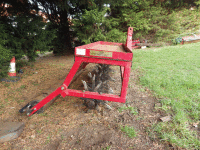
Presentation ranks highly with David. "Nobody likes to come to a match and see a poorly marked out pitch and playing surface. I take pride in the club and even have a maintenance regime for all areas around the pitch so that it looks its best at all times."
During the playing season, the pitches are marked out weekly and spiked twice a week with the SCH spiker. The Sisis Quadraplay is used after all matches to level the surface. "We also use the Verti-Drain twice a month to keep the pitch open, going in two directions. Divoting is done after each match, and we tend to use about two tonnes of 70/30 divot mix a year."
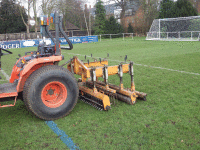
"I don't stick to a routine, I just do everything when it's needed and at the best time. This goes for everything from spraying to cutting to fertilising. The weather can be dry in East Anglia so, if it rains, we need to make the most of it, because we only have a small amount compared to the national average."
This becomes apparent after renovations. "The first part of the renovation is to scarify the surface and take as much of the dead grass and thatch off," David explains. "Then the contractor comes in with his big Verti-Drain to break up the pan. They'll usually use around 100 tonnes of sand and then overseed with a four way mix of perennial rye grass ... and then I water!"
"

"During the last eight or nine years, I've noticed that the summers are getting much warmer and drier, so I have changed my cutting regime to accommodate. I no longer box the grass off or use a cylinder mower, as I now prefer to use the ProLine roller mower with mulcher blades, which helps keep the soil covered for longer. This also helps by not drying out the pitch as quickly as it used to. Also, not taking the grass off and recycling it straight back into the ground helps keep the fertiliser bills down."
"I have the soil tested once a year by an agronomist, and I also have a soil testing kit on-site so that I know the NPK is right and, therefore, the right sort of fertiliser I need for our soil."
"I use a selective weedkiller once a year, usually around June or July, after the new seed has established, and also use liquid garlic for the prevention of chafer grubs. Due to the amount of people that just walk on the pitch, especially tourists, I try to keep the amount of pesticides to a minimum."
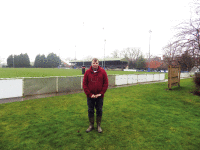
Where machinery is concerned, David says that he has a reasonably well stocked shed, but would like to have a more powerful tractor - with a cab, of course, to keep the wind out - and, with that, a larger Verti-Drain so that he can break through the pan himself.
"My local dealers are Pecks of Ely and Ernest Doe. I do a mixture of new and second-hand machinery, For instance, the Kubota tractor was bought new, replacing one that was over twenty-six years old! The outfield spiker was new, whilst the Verti-Drain is around twenty-five years old and still going strong - I didn't pay a lot for it! I usually budget for machinery over a five to seven year period so it can be written it off on the financial costing."
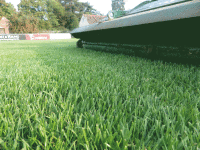
When it comes to his colleagues in the industry, David is rather concerned that volunteer groundsmen and greenkeepers are holding back the profession. "If the industry wants professional groundstaff who are prepared to go to college and work to get qualifications, shouldn't they be pushing for these people instead of rewarding volunteers who haven't got any qualifications? We need a more professional approach. Producing excellent playing surfaces is more of a science than most members of the public realise. It is little wonder that we are all on a low wage which, in turn, does not encourage people to train in sportsturf and amenity horticulture."
"I would put into place a career structure so that there were different levels of groundstaff. For example, someone with no qualifications would be a 'labourer', whilst a 'groundsman' would have to have a basic level sportsturf and amenity qualification. Grounds Managers should have equivalent to level 4 NVQ or a foundation degree. This should also help employers decide at what level they need staff and also prevents the public thinking we are all just grass cutters!"

The kit is supplied by Jack Wills, suppliers to 'the university crowd', whose clients also include Oxford, Harvard and Yale. "They supply everything from T- shirts, sweat shirts, blazers, tracksuits and waterproofs to the rugby kit. At the beginning of the season, this can be up to 100 boxes to sort through. Each team also plays a Varsity match so, as well as playing kit for day to day use, special Varsity shirts, shorts and socks are required. So, in a year, we go through around 250 shirts, 300 pairs of shorts and 200 pairs of socks, give or take a few! By the end of the season, the cupboards look quite bare!"
On a match day, I set out all the kit - shirts, shorts, socks and warm-up jackets - set up the public address system, sort out the safety stewards, put out all the temporary crowd barriers, make sure the bar is up and running and that the catering staff are happy. Then I get the ice bath sorted and make sure that both the home and away physios have enough ice for their torture. I also need to make sure that the doctor has all he needs. Oh, and then all the ballboys, and their parents, usually have to be briefed."
"By the time I've done all this, it's time to watch eighty minutes of rugby, after which I start it all over again in reverse, usually with blue and white playing kit in a nice brown heap. I don't look at the pitch until the following morning!"
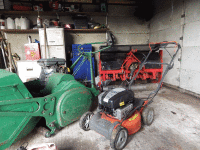
Kubota B2710 tractor
Wessex ProLine 180 roller mower rotary topping deck
Tractor mounted sprayer
Knapsack sprayer
Charterhouse Verti-Drain 1.2m
Husqvarna 18" rotary mower
Ransomes Mastiff cylinder mower
Spray linemarker
SCH outfield spiker
Stihl chainsaw
Stihl blower
Stihl hedgecutter
Stihl multiunit with long reach hedgecutter, strimmer head and brush
Sisis Quadraplay
Small fertiliser spreader
SCH trailer
SCH custom-built trailer specifically made for the frost sheets
